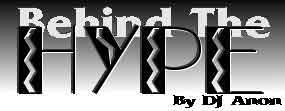|
|
| xmag.com
: November 2001 : Behind the Hype |

It's
that time again for High School and College term
papers that address the subject of radio censorship--insofar
as song lyrics and what can or cannot be uttered
by yours truly on the air. I know this, because
I've started to get the
e-mails from serious students asking me just that.
This doesn't bother me; in fact, I'm glad that people
take an interest in the subject. I have to warn
you: Most of the time, I'm as confused about all
of this as you are. So, let's fuck, piss and shit
our way into the wacky world of censorship!'
Years
ago, a listener asked why certain songs could get
away with 'objectionable' lyrics when others could
not; my response then, as it is now..."fuck if I
know!" No, the band wasn't paying us to keep their
songs dirty; and, no, the station wasn't responsible
for the matter in which the song was edited (unless
the record company was wise enough to send us the
unedited version, and then it was open season).
The plain fact of the matter is: Nowadays, it's
largely a judgment call on the part of individual
radio stations as to what lyrics make it on air.
The
FCC's rules define indecent speech as: "language
that, in context, depicts or describes, in terms
patently offensive as measured by contemporary community
standards for the broadcast medium, sexual or excretory
activities or organs." By this token, it's interesting
to note that in the past year, song lyrics such
as "My boyfriend's a dick. He brings a gun to school,"
has the word 'gun' edited, but not 'dick.' Yep.
It's a beautiful day in radio when you can now say
terms such as 'blow job' and 'asshole' on the air
without alarms going off and troops raiding the
building, but if a song has a drug or gun reference,
forget about it.
Personally,
I feel that's a bit over the top. If a song is encouraging
violence toward women, or telling you to shoot up,
or go out and set things on fire, then yes, that's
a song that deserves to be edited. But a song that's
merely a narrative of these things, and does not
encourage this activity, will still get edited...this
I feel is wrong. Sure, the 'bringing a gun to school'
reference isn't very timely, but the song's not
encouraging violent behavior. Is the average listener
that stupid to think that Fred Durst of Limp Bizkit
is actually telling you to go and cause mayhem and
'break stuff?' Well, as evidenced by Woodstock '99,
I guess that answer might be 'yes.' But that's the
same lame reasoning "Light My Fire" by The Doors
created so much controversy back in '67. Nowhere
in that song, however, did it tell you to go out
and burn shit. (Ed's note: Jim Morrison was warned
before going on the Ed Sullivan show to not sing
"Girl we couldn't get much higher"...a drug reference.
The show was live, so Morrison defied the censors
and sang it anyway...louder.)
How
does all this censorship shit work? The FCC is merely
a regulatory commission and not some Orwellian,
black-helicopter, snooping organization that many
would like you to believe. Most of the time, it
takes a person or group of people outside the FCC
to lodge a complaint. So if someone takes offense
to the Beastie Boys being "the illest motherfucker
from here to Gardena," they will contact the station
and/or the FCC and eventually the song gets nerfed.
A lot of the time, I think it's just a question
of what the individual radio station thinks it can
get away with and how long it takes before someone
notices. All this might seem like it's encroaching
on our freedoms, but there's still a lot that can
fly in underneath the radar. Oh, and if any of those
High School or College students want to use any
of this for their paper, they're welcome to reference
it... just make sure your Mom doesn't find this
magazine.

|
|
|
| ©
2001 X Publishing, Inc. All rights reserved. copyright | trademark | legal notices |
|





